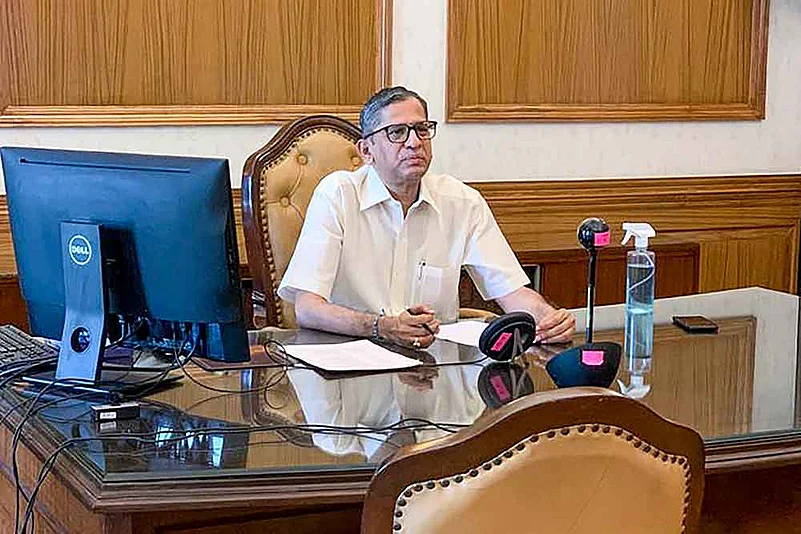On Monday, the Supreme Court made strong observations against the CBI over its probe into alleged fraudulent withdrawal of Rs 10 lakh from a Grameena Bank branch in 1994-95 and acquitted the accused branch manager, saying the agency "either adopted a casual and callous approach or there was some hidden pressure to derail a fair investigation".
A bench comprising Chief Justice N V Ramana and Justices Surya Kant and Hima Kohli allowed the appeal of branch manager N Raghavender against the 2009 verdict of the Andhra Pradesh High Court. The high court had dismissed the criminal appeal against the 2002 judgment of the special CBI judge, Hyderabad holding Raghavender guilty of cheating and various other offences and sentenced him to a five years of jail term. Two other accused, however, were acquitted of all the charges.
"We face no difficulty in holding that the prosecution has failed to prove the charges under Sections 409 (criminal breach of trust), 420 (cheating) and 477A (falsification of accounts) IPC against the Appellant beyond reasonable doubt. As a necessary corollary thereto, his conviction under Section 13(2) read with Section 13(1)(d) of the PC Act can also not be sustained,” the verdict, penned by Justice Surya Kant, said.
The apex court, while acquitting the branch manager, said the benefit of doubt was being extended to him on account of a "thin margin between strong suspicion and conclusive proof" and hence, he will not be entitled to initiate a second round of litigation to seek relief like reinstatement or to claim other service benefits from the bank.
In the 48-page judgment, it rapped the CBI for poor probe leading to the acquittal of the accused. "We are also constrained to observe that in this case the CBI has either adopted a casual and callous approach or there was some hidden pressure to derail a fair investigation. The resultant effect is that though there is a strong suspicion of criminal breach of trust, cheating and/or fabrication of the bank records against the appellant, but such suspicion falls short of a conclusive proof to hold him guilty of the criminal charges.
"The best evidence having been withheld by the prosecution, the benefit of doubt must be extended to the Appellant, for no conviction can be sustained on the basis of conjectures and surmises. Non-production of the records of the bank also adversely comments on the fairness and independence of the investigation conducted in the instant case,” it said.
Sparing the accused from criminal case, the bench, however, said that it has already held that the appellant was “deemed to be guilty of gross departmental misconduct”, for which the punishment of dismissal from service has been adequately awarded.
“It requires no repetition that standard of proof to establish a misconduct in a domestic enquiry i.e. even preponderance of evidence, is drastically different to those of proving a ‘criminal charge’ beyond any reasonable doubt. The appeal is accordingly disposed of in the above terms. Bail bonds, if any, furnished by the Appellant stand discharged,” it said.
Three accused, including two who were employed with Sri Rama Grameena Bank, Nizamabad, had conspired in 1994-95 to cheat the bank. The employee of the bank allegedly allowed withdrawals of Rs 10 lakh in a current account of one Nishita Educational Academy, Nizamabad without having sufficient funds, in pursuance of the agreement, the CBI had alleged.
Raghavender had worked as the branch manager in the bank and Sandhya Rani, the accused number 2, was working as a clerk-cum-cashier there from 1991-1996, the agency had said, adding Vinay Kumar was the third accused and was the treasurer of Nishita Educational Academy. Two accused were acquitted by the courts below and the branch manager was allowed to walk free by the top court.
The apex court, in the verdict, said, “First, no financial loss was caused to the bank. Second, the record before us does not indicate that any pecuniary loss was caused to B Satyajit Reddy or to any other customer of the bank. Third, the material before us does not disclose any conspiracy between the accused persons. In the absence of any reliable evidence that could unfold a prior meeting of minds, the High Court erred in holding that appellant and other accused orchestrated the transactions in question to extend an undue benefit to Accused No.3."
The verdict dealt with the ingredients of various offences alleged to have been committed by the accused. “Section 409 IPC pertains to criminal breach of trust by a public servant or a banker, in respect of the property entrusted to him. The onus is on the prosecution to prove that the accused, a public servant or a banker was entrusted with the property which he is duly bound to account for and that he has committed criminal breach of trust...,” it said.
There is no doubt that the accused branch manager had the sole authority to issue and pass the "three loose cheques", but no evidence has been led that it was an illegal practice, it said, adding, “We are of the considered opinion that the Prosecution has failed to establish the charge of criminal breach of trust against the Appellant beyond a reasonable doubt." PTI SJK SMN
-With PTI Inputs
























